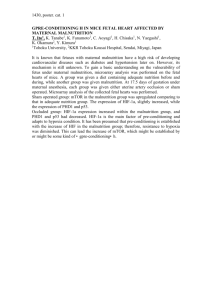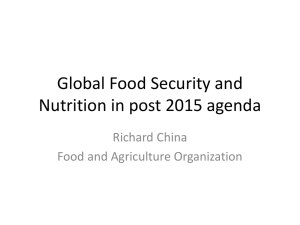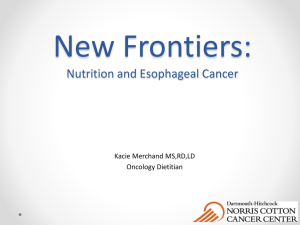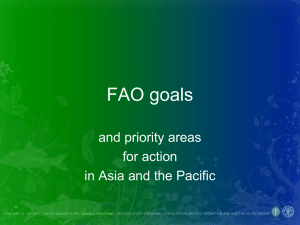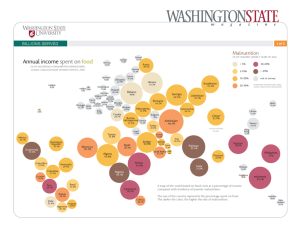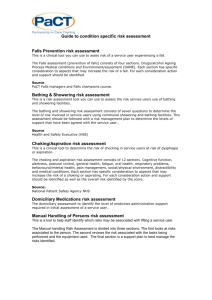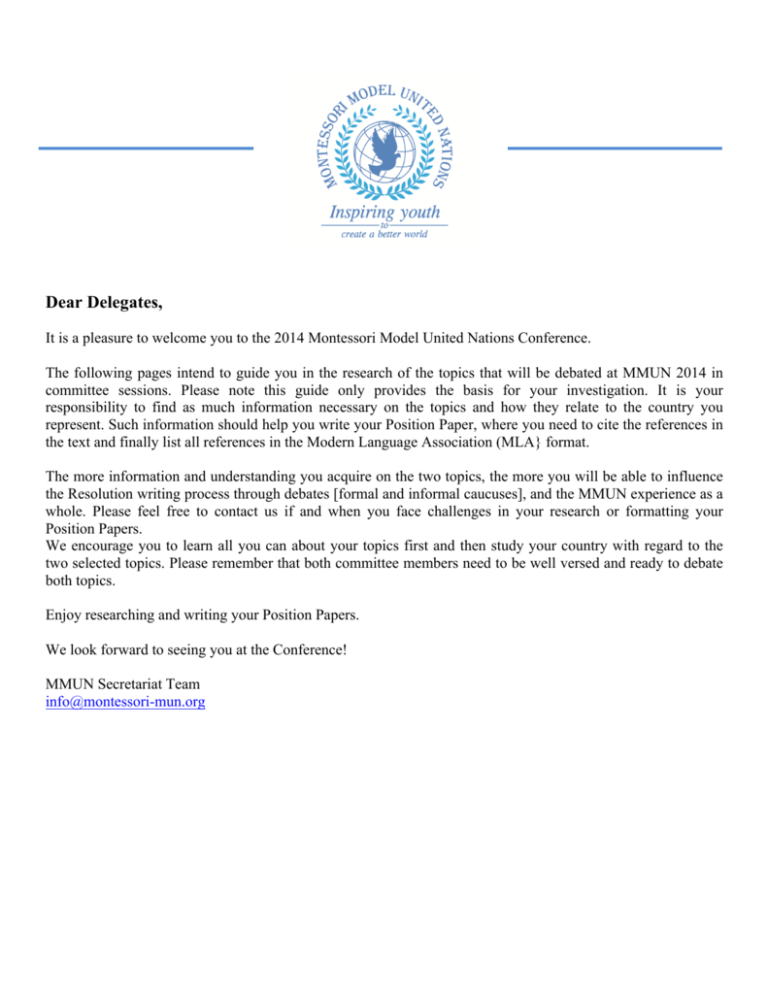
Dear Delegates,
It is a pleasure to welcome you to the 2014 Montessori Model United Nations Conference.
The following pages intend to guide you in the research of the topics that will be debated at MMUN 2014 in
committee sessions. Please note this guide only provides the basis for your investigation. It is your
responsibility to find as much information necessary on the topics and how they relate to the country you
represent. Such information should help you write your Position Paper, where you need to cite the references in
the text and finally list all references in the Modern Language Association (MLA} format.
The more information and understanding you acquire on the two topics, the more you will be able to influence
the Resolution writing process through debates [formal and informal caucuses], and the MMUN experience as a
whole. Please feel free to contact us if and when you face challenges in your research or formatting your
Position Papers.
We encourage you to learn all you can about your topics first and then study your country with regard to the
two selected topics. Please remember that both committee members need to be well versed and ready to debate
both topics.
Enjoy researching and writing your Position Papers.
We look forward to seeing you at the Conference!
MMUN Secretariat Team
info@montessori-mun.org
FOOD AND AGRICULTURE ORGANIZATION
Achieving food security for all is at the heart of FAO's efforts – to make sure
people have regular access to enough high-quality food to lead active, healthy
lives.
Our three main goals are: the eradication of hunger, food insecurity and
malnutrition; the elimination of poverty and the driving forward of economic and
social progress for all; and, the sustainable management and utilization of natural
resources, including land, water, air, climate and genetic resources for the benefit
of present and future generations.
Source: http://www.fao.org/about/en/
©Montessori Model United Nations. All rights reserved.
Website: www.montessori-mun.org
Email: info@montessori-mun.org
Malnutrition
Topic Background
Food is essential for human survival. However, for many of the world’s poor and victims of conflict and natural
disasters, finding enough to eat is a real struggle. The number one health risk worldwide is malnutrition, the
condition that occurs when your body does not get enough nutrients. Though malnutrition can sometimes be
cause by medical conditions, the most common cause of malnutrition in the developing world is an inadequate
or unbalanced diet. Malnutrition continues to be a significant problem all over the world, especially among
children. Poverty, natural disasters, political problems, and war all contribute to malnutrition and starvation.
In some cases, malnutrition is very mild and causes no symptoms. However, sometimes it can be so severe that
the damage done to the body is permanent. Children who suffer from malnutrition do not grow properly, and
may become underdeveloped in terms of both physical handicaps and brain function. If untreated, malnutrition
and starvation can lead to mental or physical disability, illness, and even death. In contrast, proper nutrition is a
powerful tool for health and development. People who are well nourished are more likely to be healthy,
productive and able to learn. Good nutrition benefits families, their communities and the world as a whole.
Since the mid-1990s, the number of chronically hungry people in developing countries has increased at a rate of
almost four million people per year. Chronic hunger affects more than 800 million people. There are more than
1 billion people worldwide who are undernourished. A person who is undernourished does not eat enough
calories to meet his or her daily minimum needs to perform everyday activities. Daily undernourishment and
chronic hunger are less publicized than the food emergencies that result from wars and natural disasters, but
they account for more than ninety-two percent of world hunger.
When people live on less than the recommended daily amount of 2,100 calories for long periods of time, the
body compensates for the lack of energy by reducing physical and mental activities. When people are hungry,
they cannot concentrate, do not take initiative, and become lethargic. Hunger also weakens the immune system.
Children are especially vulnerable to malnutrition, which weakens their immune systems and can cause them to
die from common infections like measles and diarrhea. Of the nearly 11 million children who die every year
before reaching the age of five, 53% of these deaths are associated with malnutrition.
There is an abundance of food in the world – more than enough to feed the total population of all countries.
However, more than one in seven people are hungry and one in three children is underweight. Most of the
world’s hungry live in developing countries. According to the Food and Agriculture Organization (FAO), there
are more than 1 billion hungry people in the world and 915 million of them are in developing countries. Most of
them, about 75%, belong to farming communities dependent on the land for their livelihoods. Malnutrition is
not just the result of too little food, but is based on a combination of factors.
Malnutrition is most commonly seen in the Sub-Saharan area within Africa as well as parts of Asia.1
Malnutrition is considered a slow, quiet killer among children, but can be prevented if proper measures are
followed.
©Montessori Model United Nations. All rights reserved.
Website: www.montessori-mun.org
Email: info@montessori-mun.org
Past International Action
In 2000 the UN created the Millennium Development Goals (MDGs), eight goals for the UN to improve the
world by 2015. The first MDG aims to “Reduce by half the proportion of people who suffer from hunger”. It
stated that access to food is a basic human right. Everyone is entitled to the protection of his or her basic human
rights. The United Nations has addressed the issue of human rights on many occasions. In addition, Article 25
of the Universal Declaration of Human Rights says that all people have the right to a decent standard of living
including access to food, clothing, and housing.
The World Food Programme has worked to provide pregnant women with the proper vitamins and nutritional
assistance to avoid malnutrition in newborns. Their concern carries through the first two years of life for
children as they monitor the amount of food intake. The WFP works in partnerships with UNICEF and other
groups to ensure proper nutritional care for children. Though they have implemented creative and unique ways
to keep civilians healthier, greater steps must be taken to spread assistance to those in need.1 The 1995 World
Food Summit outlined the basics revolving around malnutrition and minimal solutions, but the UN has
produced few solid instructions. 1
Under an agreement with the UN Children’s Fund (UNICEF), World Food Program (WFP) addresses moderate
malnutrition while UNICEF focuses on severe malnutrition. By treating moderate malnutrition, WFP tries to
prevent children from slipping into severe malnutrition. In many emergency settings, there may be eight or ten
times as many children suffering from moderate malnutrition as those suffering from severe acute malnutrition.
WFP has a strong field presence in most of the world's food insecure regions, with food distribution structures
are in place in over 70 countries. WFP tries to tailor its responses to meet specific nutritional needs, from more
food in general to specific vitamins or minerals.
Possible Solutions
The UN actively works to improve the lives of those with little food or inability to purchase nutritional food.
Since malnutrition has had such a large effect on African and Asian life, this committee will work to find
creative but logical solutions to alleviate the suffering that takes place among underprivileged children.
Delegates should consider delivery and distribution of food and vitamins, as well as the development of specific
food plans for each civilian. The rights of a child are obviously taken in great consideration when handling
minors and should not be forgotten as time progresses on this issue. Solutions should focus on the places and
people that suffer the most from malnutrition in both emergency and chronic situations. Another important issue
is funding and sustainability of these anti-malnutrition programs.
With a disorder resulting in the death of such young and innocent children, it is our duty as citizens of the world
to provide them with defense against dangerous issues. It is absolutely necessary to ensure the safety and health
of these children to guarantee that the world has wholesome leaders for the future.
©Montessori Model United Nations. All rights reserved.
Website: www.montessori-mun.org
Email: info@montessori-mun.org
Further Research
Guiding Questions
1. Does your nation have a history with malnutrition? If so, what steps has it taken to alleviate it?
2. What is the most effective way to deliver and distribute vitamins and food?
3. What sort of research or supplements can be used to further assist those suffering from malnutrition?
Research Sources
•
World Food Programme malnutrition page: http://www.wfp.org/hunger/malnutrition
•
Food and Agricultural Organization hunger page: http://www.fao.org/hunger/en/
•
2012 World Hunger and Poverty Facts and Statistics:
http://www.worldhunger.org/articles/Learn/world%20hunger%20facts%202002.htm
1
1 Cora, Cat. BrainyQuote. Xplore, n.d. Web. 19 Aug. 2012.
<http://www.brainyquote.com/quotes/quotes/c/catcora442586.html>.
1
2 "World Food Programme Fighting Hunger Worldwide." What Is Malnutrition? N.p., n.d. Web. 19 Aug. 2012.
<http://www.wfp.org/hunger/malnutrition>.
3 "Fighting Malnutrition." Fighting Malnutrition. N.p., n.d. Web. 19 Aug. 2012.
<http://www.iaea.org/Publications/Magazines/Bulletin/Bull502/50205814344.html>.
4 "World Food Programme Fighting Hunger Worldwide." How WFP Fights Malnutrition. N.p., n.d. Web. 19 Aug. 2012.
<http://www.wfp.org/nutrition/how-wfp-fights-malnutrition>.
5 "World Food Summit." Food and Agriculture Organization of the United Nations. N.p., n.d. Web. 19 Aug. 2012.
<http://www.fao.org/wfs/resource/english/ungarese.htm>.
©Montessori Model United Nations. All rights reserved.
Website: www.montessori-mun.org
Email: info@montessori-mun.org

